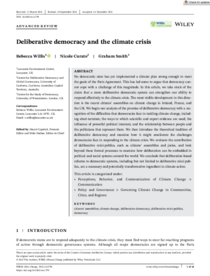Deliberative democracy and the climate crisis

Willis, Rebecca ; Curato, Nicole ; Smith, Graham
2022
13
2
e759
climate change ; democracy ; governance
France ; Ireland ; United Kingdom
Politics
https://doi.org/10.1002/wcc.759
English
Bibliogr.
"No democratic state has yet implemented a climate plan strong enough to meet the goals of the Paris Agreement. This has led some to argue that democracy cannot cope with a challenge of this magnitude. In this article, we take stock of the claim that a more deliberative democratic system can strengthen our ability to respond effectively to the climate crisis. The most visible development in this direction is the recent citizens' assemblies on climate change in Ireland, France, and the UK. We begin our analysis of the promise of deliberative democracy with a recognition of the difficulties that democracies face in tackling climate change, including short-termism; the ways in which scientific and expert evidence are used; the influence of powerful political interests; and the relationship between people and the politicians that represent them. We then introduce the theoretical tradition of deliberative democracy and examine how it might ameliorate the challenges democracies face in responding to the climate crisis. We evaluate the contribution of deliberative mini-publics, such as citizens' assemblies and juries, and look beyond these formal processes to examine how deliberation can be embedded in political and social systems around the world. We conclude that deliberation-based reforms to democratic systems, including but not limited to deliberative mini-publics, are a necessary and potentially transformative ingredient in climate action."
Digital
The ETUI is co-funded by the European Union. Views and opinions expressed are however those of the author(s) only and do not necessarily reflect those of the European Union or the ETUI.